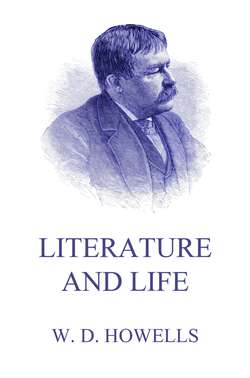Читать книгу Literature And Life - William Dean Howells - Страница 6
На сайте Литреса книга снята с продажи.
I.
ОглавлениеLiterature is at once the most intimate and the most articulate of the arts. It cannot impart its effect through the senses or the nerves as the other arts can; it is beautiful only through the intelligence; it is the mind speaking to the mind; until it has been put into absolute terms, of an invariable significance, it does not exist at all. It cannot awaken this emotion in one, and that in another; if it fails to express precisely the meaning of the author, if it does not say him, it says nothing, and is nothing. So that when a poet has put his heart, much or little, into a poem, and sold it to a magazine, the scandal is greater than when a painter has sold a picture to a patron, or a sculptor has modelled a statue to order. These are artists less articulate and less intimate than the poet; they are more exterior to their work; they are less personally in it; they part with less of themselves in the dicker. It does not change the nature of the case to say that Tennyson and Longfellow and Emerson sold the poems in which they couched the most mystical messages their genius was charged to bear mankind. They submitted to the conditions which none can escape; but that does not justify the conditions, which are none the less the conditions of hucksters because they are imposed upon poets. If it will serve to make my meaning a little clearer, we will suppose that a poet has been crossed in love, or has suffered some real sorrow, like the loss of a wife or child. He pours out his broken heart in verse that shall bring tears of sacred sympathy from his readers, and an editor pays him a hundred dollars for the right of bringing his verse to their notice. It is perfectly true that the poem was not written for these dollars, but it is perfectly true that it was sold for them. The poet must use his emotions to pay his provision bills; he has no other means; society does not propose to pay his bills for him. Yet, and at the end of the ends, the unsophisticated witness finds the transaction ridiculous, finds it repulsive, finds it shabby. Somehow he knows that if our huckstering civilization did not at every moment violate the eternal fitness of things, the poet’s song would have been given to the world, and the poet would have been cared for by the whole human brotherhood, as any man should be who does the duty that every man owes it.
The instinctive sense of the dishonor which money-purchase does to art is so strong that sometimes a man of letters who can pay his way otherwise refuses pay for his work, as Lord Byron did, for a while, from a noble pride, and as Count Tolstoy has tried to do, from a noble conscience. But Byron’s publisher profited by a generosity which did not reach his readers; and the Countess Tolstoy collects the copyright which her husband foregoes; so that these two eminent instances of protest against business in literature may be said not to have shaken its money basis. I know of no others; but there may be many that I am culpably ignorant of. Still, I doubt if there are enough to affect the fact that Literature is Business as well as Art, and almost as soon. At present business is the only human solidarity; we are all bound together with that chain, whatever interests and tastes and principles separate us, and I feel quite sure that in writing of the Man of Letters as a Man of Business I shall attract far more readers than I should in writing of him as an Artist. Besides, as an artist he has been done a great deal already; and a commercial state like ours has really more concern in him as a business man. Perhaps it may sometime be different; I do not believe it will till the conditions are different, and that is a long way off.
